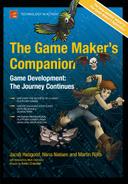Book Description
The Game Maker’s Companion is the long-awaited sequel to The Game Maker’s Apprentice. This book picks up where the last book left off, advancing your game development journey with some seriously impressive gaming projects. This time you’ll learn how to make professional-quality platform games with solid collision detection and slick control mechanisms and you’ll get acquainted with a long-lost icon of platform gaming history on the way.
You’ll go on to discover techniques to add depth and believability to the characters and stories in your games, including The Monomyth, cut scene storyboarding, and character archetypes. This culminates in the creation of an original atmospheric platform-adventure which will take your GML programming skills to new heights. There’s even a handy reference section at the back of the book which will be invaluable for adding common features to your own games.
With contributions from four games industry professionals and a highly respected member of the Game Maker community, The Game Maker’s Companion is another labor of love that will give you even more hours of enjoyment than the original. If you already own Game Maker, then you really must own this book as well.
Table of Contents
- Copyright
- Foreword
- About the Authors
- About the Artists
- About the Technical Reviewer
- Acknowledgments
- Introduction
- 1. Fishpod
- 1. Greetings, Game Maker
- 2. Platform Beginnings: An Idea with Legs
- 2. Zool
- 3. Zool: Taking It to the Nth Dimension
- 4. Empowerment: Sliding Ninjas
- 5. Krool's Forces: Sweetening the Challenge
- 6. Fighting Talk: The Empower Strikes Back
- 3. Shadows on Deck
- 7. Game Design: "Shadows on Deck"
- 8. Storytelling in Theory
- 8.1. What Can a Story Do for My Game?
- 8.2. Little or Big Story?
- 8.3. Story Structures
- 8.3.1. The Three-Act Structure
- 8.3.2. The Hero's Journey
- 8.3.2.1. The Ordinary World
- 8.3.2.2. The Call to Adventure
- 8.3.2.3. Refusal to the Call
- 8.3.2.4. Meeting with the Mentor
- 8.3.2.5. Crossing the First Threshold
- 8.3.2.6. Tests, Allies, and Enemies
- 8.3.2.7. Approach to the Innermost Cave
- 8.3.2.8. The Ordeal
- 8.3.2.9. Reward
- 8.3.2.10. The Road Back
- 8.3.2.11. Resurrection
- 8.3.2.12. Return with the Elixir
- 8.3.3. The Structures Working Together
- 8.4. Pace
- 8.5. Characters
- 8.6. Interactive Stories
- 8.7. Tools to Tell a Story Inside a Game
- 8.8. Conclusion: Where's the Skip Button?
- 9. Storytelling Applied
- 9.1. Applying the Theory to Shadows on Deck
- 9.1.1. The Ordinary World
- 9.1.2. The Call to Adventure
- 9.1.3. The Refusal to the Call
- 9.1.4. The Meeting with the Mentor
- 9.1.5. Crossing the First Threshold
- 9.1.6. Tests, Allies, and Enemies
- 9.1.7. Approach to the Innermost Cave
- 9.1.8. The Ordeal
- 9.1.9. The Reward
- 9.1.10. The Road Back
- 9.1.11. The Resurrection
- 9.1.12. Return with the Elixir
- 9.2. Archetypes for Our Story
- 9.3. Titles Tantrum
- 9.4. Storytelling Tools for Shadows on Deck
- 9.5. Conclusion
- 9.1. Applying the Theory to Shadows on Deck
- 10. Of Mice and Pen: Pirate Art
- 11. GML: From Ninja to Pirate
- 12. Rogues' Rendezvous: Vertically Sliced
- 13. The Story Begins
- 4. Reference
- 14. Feature Reference
- 14.1. 360-Degree Movement
- 14.2. 360-Degree Shooting
- 14.3. Cheat Codes
- 14.4. Countdown Clock
- 14.5. Fancy Buttons
- 14.6. Four- and Eight-Way Movement
- 14.7. Grid Movement
- 14.8. Homing Missiles
- 14.9. Mini-Map
- 14.10. Mouse Aim-and-Fire
- 14.11. Mouse Cursor
- 14.12. Moving Through Rooms
- 14.13. Orbiting Objects
- 14.14. Patrolling Enemies
- 14.15. Pausing the Game
- 14.16. Pushing Boxes
- 14.17. Scrolling Text (Horizontal)
- 14.18. Scrolling Text (Vertical)
- 14.19. Smoke Trail
- 14.20. Smooth Motion
- 14.21. Snap To Grid
- 14.22. Toggle Music and Sound Effects
- 14. Feature Reference
- A. Rogues' Rendezvous: Dialogue
